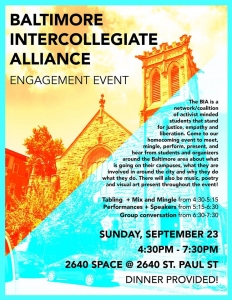
The Baltimore Intercollegiate Alliance (BIA) is an organizing group created and run by Baltimore-area students at both the undergraduate and graduate level. Maddie Wolf, a senior at MICA, said that “the BIA is a coalition network of students who are engaged in activism, advocacy, and organizing . . . What we are trying to do is to use our collective power and connection to leverage our institutional power to create positive change in Baltimore and on our campuses.” The organization was started by a group of students after the 2016 presidential election. After a formative period of self-organizing and establishing relationships around the city, the BIA has grown from a core base of members to actively creating events that give space for intercollegiate relationships to form.
An example of this relationship-building manifested itself in the collaborative process of creating and running the group’s first event, hosted on September 23rd at the 2640 Space. A number of Goucher students are already involved with the BIA. Three of these students (James Williams, ‘19, Zoe Brown, ‘19, and Noah Block, ‘21) all worked with students from other colleges in the Baltimore area when planning this first event. Block remarked that the collaborative process of planning this event “gets to the goals and values of BIA, which is to promote collaboration and [our] approach to the values of justice and equity that we’re fighting for and we can’t do that in silos. [BIA] provides a leadership path for people from different campuses to engage with each other collaboratively and meaningfully across campus boundaries and communities.”
The BIA defines its mission and values in an organizational manifesto. According to that document, the members of the group believe in promoting “direct action,” “building and sustaining relationships with community organizations,” and “challenging political influence on social institutions.” At this first event, Steph Saxton, a graduate student from Johns Hopkins University, spoke directly to all of these tenets while talking about the organization Students Against Private Police. This organization was started in March 2018 in response to Johns Hopkins University’s administration creating a bill to begin making a police force that Saxton described as “separate from BPD, to patrol the campuses and the surrounding neighborhoods.” This action did not involve input from students, faculty, or members of the local community. The organization protested, testified in Annapolis, and the bill was pulled because of “student efforts.” “We do have student power,” Saxton said and stressed that the group had support from other organizations, including the BIA. “All of us are in this room right now because we believe, in some way, that student voices can speak to these institutions against their natural inclination towards capital accumulation,” Saxton said, “we believe that we can stop these institutions from their extractive practices on poor and Black Baltimore, and that’s what we want to do.”
The BIA’s manifesto also states that the organization “[strives] to mobilize the Baltimore college student body.” Sonia Borenstein, a student at UMBC, spoke directly to this point during her presentation on mobilization, which she defined as “people coming together, usually in grassroots causes, working towards a common goal with a drive for getting it done with specific goals and plans in mind.” Borenstein emphasized the importance of mobilization, stating that “it has always been the mass mobilization of people that has truly gotten change to society.” Mobilization, she said, involves “showing up, showing you’re there, sending your voice, your aid, your time, your labor, your dedication all to the goals you’ve collectively set up.”
The event concluded with students gathering together to begin brainstorming different goals for the academic year. These goals included holding those in power on campus accountable, focusing on mental health, opening up conversation about sexual assault, and “active LGBTQIA inclusion on campuses.”
One of the most critical elements of how the BIA functions is that it runs off of student power. As a student on a campus in the greater Baltimore area, each of us has the ability to add our own insights on current political issues. Those insights and connections to our own identities help generate momentum around current social movements. The only way to make that happen is to show up. To connect with the BIA, join their contact list at bit.ly/JOINBIA.
BY SKYLER AIKERSON AND NEVE LEVINSON
